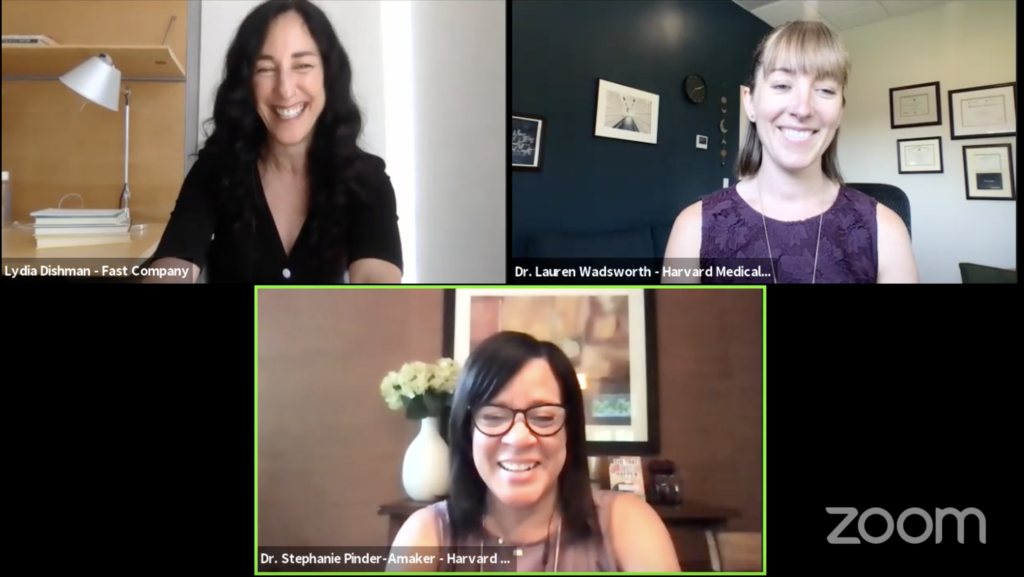A Sense of Belonging: How to Make It Sustainable


There’s a message posted in the meeting room of Dr. Lauren Wadsworth, a clinical psychologist and senior instructor in psychiatry. It reads: “Feedback is a gift.”
The posting includes a step-by-step process to accept feedback openly and without defensiveness. These are a few of the key tools needed, Wadsworth believes, to create a culture of belonging inside the workplace.
Wadsworth and Dr. Stephanie Pinder-Amaker, a clinical psychologist and Harvard Medical School professor, co-wrote the new book Did That Just Happen?! Beyond “Diversity”–Creating Sustainable and Inclusive Organizations. A key word in the title is “sustainable.” At From Day One’s July virtual conference, “Diversity’s Many Roles: How Mentors, Sponsors and Allies Each Play a Part in Inclusion,” they spoke with Fast Company staff editor Lydia Dishman about how organizations can go beyond one-off diversity training and other just-fix-it approaches to build a longer-term foundation.
Both Wadsworth and Pinder-Amaker emphasized a few things from the start: diversity, equity and inclusion (DEI) in the workplace is everyone’s responsibility as well as a lifelong journey that can’t be boiled down into check-the-box compliance trainings. “Box-checking training is a common mistake,” Wadsworth noted. “When we work with organizations, we view it more as a relationship.”
And instead of companies focusing their efforts on finding the “right” training program in the marketplace, they should start by gathering internal data about what employees want and need. “You have to do some sort of needs assessment,” Pinder-Amaker said. “You have to understand your training toward what end, asking what do we really need, before going out and bringing in the training.”

In the midst of training, Wadsworth and Pinder-Amaker said, it’s important for the participants to practice self-compassion. “We were all raised in this society, all trained to be racist, sexist, homophobic, transphobic,” Wadsworth said. “We expect you to come in with these biases. As we’re doing this work, we expect you to mess up, and when you do, we hope you can name and acknowledge it.”
Pinder-Amaker talked about the concept of physiological safety, or the sense that you can speak your mind or stick your neck out without being punished for it. An organization has created that climate if “the person with the least amount of privilege and power in your organization still feels valued, seen, heard, and a sense that they belong.” She stressed that “it’s an all-or-nothing proposition,” in the sense that everyone in the organization has to feel that safety, or no one really does.
The co-authors offered up communication tools necessary for having the hard conversations that might test that sense of safety. “Calling in” instead of “calling out” is a more effective way to navigate hard conversations, as well as accepting feedback gracefully. “You can reframe feedback not as punishing, but as a gift–you say that person trusted us enough to share that extremely vulnerable thing,” said Wadsworth.
As part of their work on the new book, Pinder-Amaker and Wadsworth have been rethinking the language used in talking about DEI. Some of the identifying terms in common use are overly “deficit-based,” the authors said. For example, instead of using terms like “marginalized communities” or “minorities,” the pair prefers “rising identity” and “rising population.” As Pinder-Amaker put it, “We think it’s just really beautiful and empowering.”
They also advocate replacing the term “micro” in the popular term “microaggressions.” Explained Wadsworth: “The idea is that they’re little and subtle and we don’t see them, but I think that prioritizes the privileged person in calling it micro, and not the person who was hurt,” Wadsworth said. Nor does it do justice to the accumulated weight of these aggressions. The pair instead uses the term “identity-related aggressions.”
For people with enough empathy to know when they’ve made a mistake, Pinder-Amaker emphasized the importance of “the empowering apology.” It’s an acknowledgment of harm, putting focus on the person who has been injured, and an openness to how that person needs to process your apology. “Learning how to own your behavior sounds like such a basic recommendation,” she said. “But we are really bad at apologizing, just taking responsibility, and saying ‘I really screwed that up.’”
Emily Nonko is a Brooklyn, NY-based reporter who writes about real estate, architecture, urbanism and design. Her work has appeared in the Wall Street Journal, New York magazine, Curbed and other publications.
The From Day One Newsletter is a monthly roundup of articles, features, and editorials on innovative ways for companies to forge stronger relationships with their employees, customers, and communities.